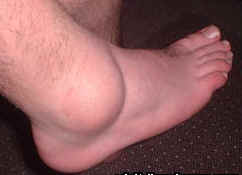IF YOUR STARTING CENTER IS PLAYING ON ONE OF THESE YOUR OFFENSE IS IN TROUBLE
....AND DON'T LAUGH---A LOT A TIMES THEY DO OR ARE FORCED TO TRY!

Key Injuries
IF YOUR
STARTING CENTER IS PLAYING ON ONE OF THESE YOUR OFFENSE IS IN TROUBLE
....AND DON'T LAUGH---A LOT A TIMES THEY DO OR ARE FORCED TO TRY!

Always remember the importance of checking for injuries before getting too deeply involved in your plays.
In
football---main positions are QB and Center. Loss of a good center with
experience has a HUGE
IMPACT on the team. We start with the mechanics of the QB exchange and
ability to snap long in shotgun situations which we see so much today.
Lets assume he can do a good job there. MOST IMPORTANTLY He is the
eyes of the offensive line. He changes and alters blocking assignments
through calls at the line of scrimmage. When he sees blitzes or stunts are
coming he will alert his teammates, and direct help to defensive
overloads. Sometimes you will see a center point to a defensive player or
area while yelling out instructions. He's flat out telling someone who to
take, or who he is going to take, or he's making a predetermined switch from
standard blocking rules based on the offensive play that's been called
. Sometimes there's no need or time for secrets in the trenches--------"hey
Joe........I got number 52" ........"You get
77". "Hike". When
impromptu adjustments must be made---- slick blocking schemes will go out the
door. Then it's as simple as one- on- one in a boxing
ring. "youre my man----bring it on" It's the centers
job to direct his fellow linemans blocking adjustments. It's also up
to the running backs to understand what is going on down front and
mentally anticipate his own adjustment. The QB who has
confidence in the ability and decision making of his center can take the snap
with the belief that he won't get buried by a pass rush or blitz
package, or have his play call busted up before it starts.
That's one reason why a good center plays so long in the league---------10, 12,
15 years. A good one is hard enough to find and a great one becomes a
cornerstone of the franchise.
In hoop----- a point guard whose hurt or out is absolutely critical because he is the teams CEO---their director on the floor------- and most every play begins with his involvment. In press situations he will have major responsibility in getting the ball across the time line and must be able to handle traps and make good passing decisions when under pressure.. When a good pointman is hurt or out, expect the opposing coach to go after his replacement like a flock of vultures attacking a squirrel. Before you realize it ----the other team is up 16-2. Your team is shell shocked---you're shellshocked and the young pointman looks like he's been through a tornado. I always think about Nolan Richardson's "40 minutes of hell" from his deep athletic teams of 8 years or so ago, and Pitino's teams at Kentucky that had the player depth and understanding of passing lane vulnerabilities that were set up from trapping pressure. (didn't work in pros because pros can handle the pressure) Many times a young and inexperienced point guard is attacked like a slab of beef tossed into a lions cage. Good guard play makes or breaks a team, and an experienced guard who is out, or missing is hard to replace overnight. Look also for injuries to key rebounders---a guy whose been consistently a top rebounder is a huge loss. A go- to shooter---look what Iowas's loss of Luke Recker has done to that team. When they look for their "main man"---he's not there when they need him. If a players been replaced---look for a player with productive experience. An upper classman whose accepted his role as a reserve and who will have the experience and maturity to step in. Sometimes a younger player with more ability will not adapt to the pressure as well, or try to do too much and play out of control. If you can recognize and project the impact of injury and player loss before the odds maker can adjust an easy win can often be had. Sometimes even by going against a team you liked when you explored the injury situation further.
Those above examples are just few of the key people to watch for when injured. Thinkwin